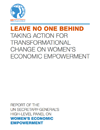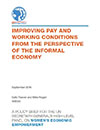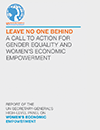This year long initiative (March 2016-17) brought together leaders from civil society and the private and public sectors to define an actionable agenda for advancing gender equality and improving economic outcomes for women in the context of the 2030 Sustainable Development Goals (SDG's). Research, consultations and dialogue with a broad set of stakeholders led to two reports that highlight positive practices and provide a series of action and impact-oriented recommendations.
Blog post (2017): Towards a Transformative Agenda for Women’s Economic Empowerment
Renana Jhabvala, National Coordinator of the Self-Employed Women's Association (SEWA) and Chair of the WIEGO board, represented WIEGO on the panel. She gave her expertise on women in the informal economy, grounded in her extensive experience with WIEGO and as National Coordinator of the Self-Employed Women’s Association (SEWA) of India. WIEGO Senior Advisor Marty Chen also represented WIEGO in the role of Deputy Chair.
 The UN HLP launched its follow-up report, Leave No One Behind: Taking Action for Transformational Change on Women's Economic Empowerment in March 2017 at the 61st Session of the Commission on the Status of Women.
The UN HLP launched its follow-up report, Leave No One Behind: Taking Action for Transformational Change on Women's Economic Empowerment in March 2017 at the 61st Session of the Commission on the Status of Women.
WIEGO and SEWA brought the demands, perspectives and voices of women in the informal economy into the UN HLP process. To ensure these were r eflected in the panel report, WIEGO produced six policy briefs for the UN HLP:
eflected in the panel report, WIEGO produced six policy briefs for the UN HLP:
- Improving Pay and Working Conditions
- Eliminating Legal Barriers
- Financial and Digital Inclusion
- Child Care
- Expanding the Economic Potential of Informal Workers
- Enhancing the Productivity of Own Account Enterprises
 The UN HLP launched its first report, Leave No one Behind: A Call to Action for Gender Equality and Women’s Economic Empowerment” in September 2016 at the UN General Assembly.
The UN HLP launched its first report, Leave No one Behind: A Call to Action for Gender Equality and Women’s Economic Empowerment” in September 2016 at the UN General Assembly.
The efforts of the WIEGO network are reflected in the panel report: Informal workers are included as one of the four focal worker groups, and the need for increased voice, visibility and validity of informal workers is clearly established.
The report outlines a set of recommendations for improving outcomes for informal workers including: extension of legal recognition, identity and protection; extension of labour rights; inclusion of organizations of informal workers in rule-setting, policy making and collective bargaining processes; favourable regulation of public space; and support for training for informal workers.
Meeting of panelists and deputies:
- Inaugural panel meeting (15 March, 2016)
- Deputies meeting (29 June, 2016)
- Second panel meeting (15 July, 2016)
- Report launch at United Nations General Assembly (22 September, 2016)
Consultations:
Round table on women-owned businesses: 17 May, 2016, Washington D.C.
Martha Chen and Marlese Von Borembsen participated in a round table discussion on women-owned businesses designed as an input to the SGHLP. The event was hosted by IDRC, WeConnect International and the Urban Institute. Marlese and Martha presented on the unique legal barriers that women informal workers face both as workers and as women. Specifically they discussed barriers and enabling factors for women own-account operators and cooperatives/producer groups.
Ottawa Consultation: 6 June 2016, Ottawa, Canada
Sofia Trevino and Olga Abizaid participated in the UN SGHLP consultation process in Ottawa, facilitated by the Canadian government. This session was chaired by the Executive Director of UN Women, the Hon. Phumzile Mlambo-Ngcuka, and attended by Canadian civil society leaders and private and public sector representatives. All participants were invited to provide their input into the deliberations on three of the six major issue areas of the UN SGHLP, namely: Investing in care work or the care economy, improving pay and work conditions and enhancing the productivity of women-owned enterprises.
Latin America Regional Consultation and C189 Side Event: 13 and 14 July 2016, San Jose, Costa Rica
Over two days - July 13 and 14 - a WIEGO delegation participated in the UN HLP Latin America Regional Consultation and a side event concerning the ratification of Convention 189 on Domestic Work in Latin America. Delegates participated in panel discussions, round table working sessions, and contributed their insights during a plenary session.
At this consultation, members of the Self-Employed Women's Association (SEWA) from across India shared their diverse experiences as workers in the informal economy with members of the UN HLP and other distinguished guests. The consultation took place at SEWA headquarters in Ahmedabad, Gujarat state, India.
WIEGO-Oxfam Grassroots Consultation for Southern Africa: 10 August, Johannesburg, South Africa
WIEGO and Oxfam co-hosted a consultation focused on grassroots women's organizations and movements in South Africa and the region.
The consultation focused on prioritising the voices of women’s rights organisations and movements to set out how the agenda for women’s economic empowerment can be best implemented in Africa and globally, including by outlining what role women’s rights organisations play and what support they may need.
WIEGO Resources:
Compendium of WIEGO-SEWA Case Studies for UN HLP
Additional Resources:
- UN Women HLP platform
- UN Women press release (English)
- ONU Mujeres comunicado de prensa sobre el panel (Español)
- UN Women Secretary General’s High Level Panel for Women’s Economic Empowerment Framing Paper
- WIEGO’s approach to women’s economic empowerment
Videos
Poliana Inacio
Madalena Duarte
Ernestina Ochoa
Poonsap Tulaphan
Firoza Mehrotra
